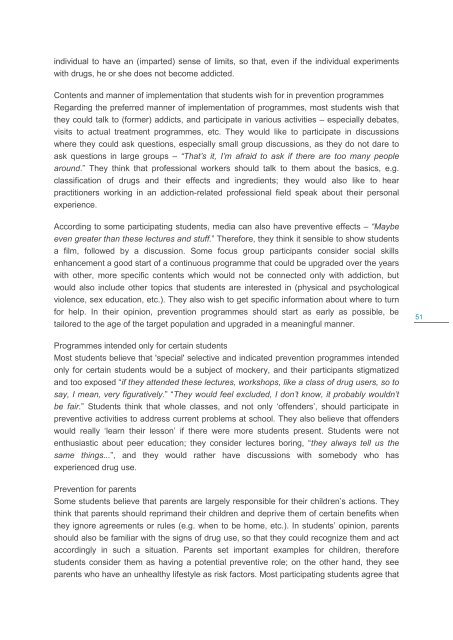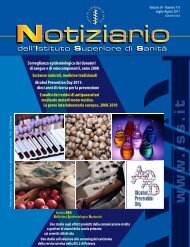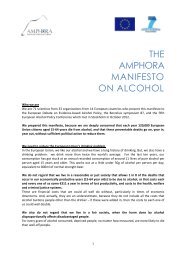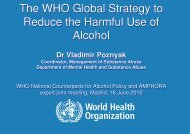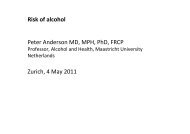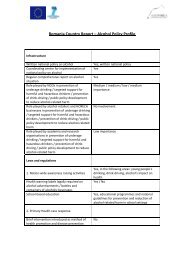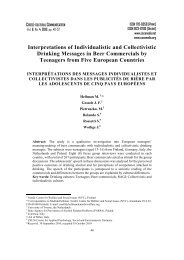According to students, prevention programmes in which they participated mostly comprisedlectures combined with PowerPoint presentations, and discussions with various professionalworkers about different psychoactive substances and harmful effects of their use. Mostprogrammes were aimed at providing information.In students’ opinion, all activities are usually quite similar. One of the students said: “... theycame twice and spoke about the same things; in fact, I think that they never tell us anythinguseful and that people find it boring and consider it a good opportunity to avoid lessons.”Students wish that preventive activities would be different and more experiential. They wishthat prevention topics would be presented to them by somebody with experience; they wouldconsider such information more credible if it was presented by such a person rather than bya professional worker who has no personal experience. On the other hand, some studentspointed out that they would appreciate combined activities performed by several professionalworkers, especially practitioners who have experience in the field of addiction – e.g. policeofficers, doctors, treatment programme employees – who would present the issues andtopics in their field of work.Students also consider problem-solving skills and the ability to make decisions as prevention.All of them emphasized that an individual's decisions play an important role in drug use. Theyalso believe that active leisure time, good and healthy company, and obligations and goalsfocused on the future have preventive effects.50Reasons for drug (non)use in young peopleStudents most often state that the reasons for the use of psychoactive substances (PAS) areproblems which individuals have to face in their life or inability to solve problems by othermeans than seeking solutions and comfort in PAS use. Students also consider the socialenvironment, family problems and especially an individual's company (friends) to beimportant factors. The effects of PAS, which bring a feeling of comfort, are also significantfactors. Many students also pointed out that the choice to use drugs depends on theindividual, his or her personality traits, boredom and curiosity. “If you are only interested in it,then you can say: no, I won’t do it. But if you resort to it, it is difficult to end it by yourself.” Ofcourse, they distinguish between experimenting and regular use and the path to addiction,but they do not think that experimental drug use is problematic or harmful. “To be surroundedby people who use drugs is totally different than to try drugs out of curiosity on a Fridaynight.”In their opinion, parents act preventively by setting limits and exerting control: “...like,parents, if they knew with whom their child hangs out ... they should do something too, ...they could talk, ... and prohibit their child from hanging out with people who are addicted, forexample.” Students also stated that things forbidden have a certain “charm”; for example,when you hide from your parents when you start smoking, you feel excited. In their opinion,the reasons keeping young people from using PAS include set goals, obligations andopportunities which they do not want to lose by using PAS. Students think it important for an
individual to have an (imparted) sense of limits, so that, even if the individual experimentswith drugs, he or she does not become addicted.Contents and manner of implementation that students wish for in prevention programmesRegarding the preferred manner of implementation of programmes, most students wish thatthey could talk to (former) addicts, and participate in various activities – especially debates,visits to actual treatment programmes, etc. They would like to participate in discussionswhere they could ask questions, especially small group discussions, as they do not dare toask questions in large groups – “That’s it, I’m afraid to ask if there are too many peoplearound.” They think that professional workers should talk to them about the basics, e.g.classification of drugs and their effects and ingredients; they would also like to hearpractitioners working in an addiction-related professional field speak about their personalexperience.According to some participating students, media can also have preventive effects – “Maybeeven greater than these lectures and stuff.” Therefore, they think it sensible to show studentsa film, followed by a discussion. Some focus group participants consider social skillsenhancement a good start of a continuous programme that could be upgraded over the yearswith other, more specific contents which would not be connected only with addiction, butwould also include other topics that students are interested in (physical and psychologicalviolence, sex education, etc.). They also wish to get specific information about where to turnfor help. In their opinion, prevention programmes should start as early as possible, betailored to the age of the target population and upgraded in a meaningful manner.51Programmes intended only for certain studentsMost students believe that 'special' selective and indicated prevention programmes intendedonly for certain students would be a subject of mockery, and their participants stigmatizedand too exposed “if they attended these lectures, workshops, like a class of drug users, so tosay, I mean, very figuratively.” “They would feel excluded, I don’t know, it probably wouldn’tbe fair.” Students think that whole classes, and not only ‘offenders’, should participate inpreventive activities to address current problems at school. They also believe that offenderswould really ‘learn their lesson’ if there were more students present. Students were notenthusiastic about peer education; they consider lectures boring, “they always tell us thesame things...”, and they would rather have discussions with somebody who hasexperienced drug use.Prevention for parentsSome students believe that parents are largely responsible for their children’s actions. Theythink that parents should reprimand their children and deprive them of certain benefits whenthey ignore agreements or rules (e.g. when to be home, etc.). In students’ opinion, parentsshould also be familiar with the signs of drug use, so that they could recognize them and actaccordingly in such a situation. Parents set important examples for children, thereforestudents consider them as having a potential preventive role; on the other hand, they seeparents who have an unhealthy lifestyle as risk factors. Most participating students agree that
- Page 3 and 4: 2012 NATIONAL REPORT (2011 data) TO
- Page 7 and 8: SUMMARYChapter 1Amendments to the C
- Page 9 and 10: parents, girls with associated prob
- Page 11 and 12: elated social security programmes,
- Page 13 and 14: Chapter 12Slovenia's gross domestic
- Page 15 and 16: DRUG POLICY: LEGISLATION, STRATEGIE
- Page 17 and 18: part of an addiction treatment prog
- Page 19 and 20: In addition to coordination, the In
- Page 21 and 22: Furthermore, the Health Insurance I
- Page 23 and 24: The declaration also highlights the
- Page 25: DRUG USE IN THE GENERAL POPULATION
- Page 31 and 32: Age group comparison shows that the
- Page 33 and 34: Field procedureData collection was
- Page 35 and 36: Table 2.5: Lifetime use of illicit
- Page 37 and 38: The fact that data on the prevalenc
- Page 39 and 40: Observational visits in night venue
- Page 41 and 42: Customer intoxication and incidents
- Page 43 and 44: Focus groups of high-school student
- Page 45 and 46: Figure 3.1: Excise duty per hl of e
- Page 47 and 48: Some tobacco control measures in Sl
- Page 49: data on the sale of these products,
- Page 53 and 54: Co-creating community responses in
- Page 55 and 56: As regards the intention of student
- Page 57 and 58: according to the usual schedule dur
- Page 59 and 60: Community-based preventionAnalysis
- Page 61 and 62: programme carried out in the USA an
- Page 63 and 64: They also plan to conduct workshops
- Page 65 and 66: PROBLEM DRUG USE4.‘Problem drug u
- Page 67 and 68: (with their grandmother, brother, i
- Page 69 and 70: Almost two thirds of those who inje
- Page 71 and 72: DRUG RELATED TREATMENT: TREATMENT D
- Page 73 and 74: Social protectionProfessional activ
- Page 75 and 76: 5.2 Access to treatmentIn Slovenia,
- Page 77 and 78: Figure 5.2: Number of programme use
- Page 79 and 80: 42.9% of drug users who re-entered
- Page 81 and 82: used opiates once a week, 12 (13.5%
- Page 83 and 84: The main reason for first-time admi
- Page 85 and 86: survey results, which show that onl
- Page 87 and 88: Correlation between first-time admi
- Page 89 and 90: hepatitis B free of charge in CPTDA
- Page 91 and 92: The proportion of drug users who ha
- Page 93 and 94: Trends in the proportion of users w
- Page 95 and 96: 2. The decrease in the proportion o
- Page 97 and 98: HEALTH CORRELATES AND CONSEQUENCES6
- Page 99 and 100: on the prevalence of infections tha
- Page 101 and 102:
6.2 Other drug-related health corre
- Page 103 and 104:
Table 6.3 shows the number of illic
- Page 105 and 106:
In conclusion, we can say that emer
- Page 107 and 108:
In all observed years, the number o
- Page 109 and 110:
Figure 6.4: Trends in the number of
- Page 111 and 112:
The Obalno-kraška and the Zasavska
- Page 113 and 114:
Cohort studyMortalityOnly drug user
- Page 115 and 116:
CPTDAs covering the three largest S
- Page 117 and 118:
drug users had been treated in othe
- Page 119 and 120:
Violent deaths (V01.0 - Y98.9, F11.
- Page 121 and 122:
and benzodiazepines. Three quarters
- Page 123 and 124:
life than deaths of their peers (th
- Page 125 and 126:
RESPONSES TO HEALTH CORRELATES ANDC
- Page 127 and 128:
Low-threshold programmes include fr
- Page 129 and 130:
8.1 Social exclusion and drug useTa
- Page 131 and 132:
Table 8.2: Users and capacities in
- Page 133 and 134:
9.1 Drug-related crimeStaša Šavel
- Page 135 and 136:
Secondary crimeCompared to 2010, th
- Page 137 and 138:
9.2 Prevention of drug-related crim
- Page 139 and 140:
Table 9.7: Number of persons having
- Page 141 and 142:
Patients take substitute medicine u
- Page 143 and 144:
information required for solving pr
- Page 145 and 146:
groups from other countries. Most o
- Page 147 and 148:
Table 10.1: Total amounts of seized
- Page 149 and 150:
10.3 Quality and purity of illicit
- Page 151 and 152:
CannabisThe most common type of can
- Page 153 and 154:
amounts of active components and ad
- Page 155 and 156:
Data on the purity of various illic
- Page 157 and 158:
RESIDENTIAL TREATMENT OF DRUG-USERS
- Page 159 and 160:
Photo 11.1: The old school which wa
- Page 161 and 162:
(source: Terapevtska skupnost Cenac
- Page 163 and 164:
social assistance networks is of hi
- Page 165 and 166:
schedules and through work therapy,
- Page 167 and 168:
provides drug users with medical ca
- Page 169 and 170:
programme, and draw up a report on
- Page 171 and 172:
It seems that we will have to devot
- Page 173 and 174:
Despite the absence of radical meas
- Page 175 and 176:
Purpose Funder YearAmount(EUR)Cofog
- Page 177 and 178:
that co-funding is relatively stabl
- Page 179 and 180:
Table 12.2: Drug-related expenditur
- Page 181 and 182:
12.5 ConclusionsBy 2011, the effect
- Page 183 and 184:
BIBLIOGRAPHYList of referencesAnder
- Page 185 and 186:
Klavs I, Poljak M. (2003) Unlinked
- Page 187 and 188:
SURS. (2011) Oddelek za cene življ
- Page 189 and 190:
OECD. (2012a) Country Statistical p
- Page 191 and 192:
Zakon o omejevanju porabe alkohola
- Page 193 and 194:
Table 8.2: Users and capacities in
- Page 195 and 196:
Figure 5.12: Number of first-time a


